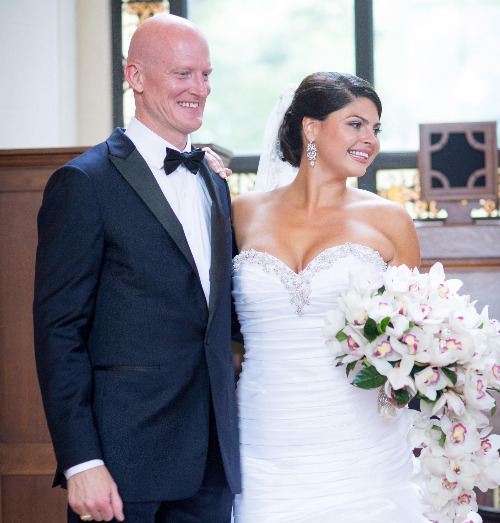Scenes from a Military Marriage: Our Journey with Binge Eating Disorder and Bulimia
Melinda developed an eating disorder while she served in the military from 2003-2008. When she met her husband Jim several years later, she was still battling binge eating disorder and bulimia. They’ve coped as a couple as Melinda began her recovery for her eating disorder.
Melinda’s Story
I developed an eating disorder beginning in 2003, when I was inducted into the United States Naval Academy. Over the next decade, this disorder stayed with me and became a defining aspect of my life.
In the military, I developed hyper-awareness around my size. How I was eating, what I was eating, and how much I was eating were heavily scrutinized by my male peers. In my uniform, the differences between my body and others’ were very visible, all of which made me extremely self-conscious.
I’d restrict, binge, and purge. Feelings of shame, and fear, and powerlessness would follow each bingeing episode.
I didn’t seek treatment while I was in the military. Seeking medical assistance is seen as a sign of weakness, especially for mental health issues. I had never heard of binge eating disorder (BED) at this point in my life. I didn’t believe that my struggle could be labeled an eating disorder, because in my mind, higher weight people couldn’t have eating disorders.
My extreme behavior to counteract my binges led to my (honorable) medical discharge from the Navy, although you won’t see anything about an eating disorder in my medical or service records. Officially, I was discharged because of a back injury, which I have later come to understand as a result of my compensatory behavior. I underwent two back surgeries before being being placed on Limited Duty after graduation, and ultimately being discharged.
I continued my unhealthy cycle of restricting and bingeing even after this medical ordeal. When my back would flare up, I wasn’t really mobile enough to compensate with exercise. But the bingeing continued.
Things got really bad around the time of my wedding. When I moved in with Jim, my disordered behavior was visible to another person for the first time. He was the one who supported me in opening up about my issues and pursuing recovery.

Jim’s Story
As a Naval Academy grad and former Naval Officer, I fell into the military “tough-guy” approach to work/life: work hard and play harder. Playing harder meant staying in good shape but also recklessly consuming large amounts of unhealthy foods and partying before “sleeping it off” and doing it all over again.
When I met Mel, she was an athlete (a runner, mostly, at the time, though I knew she’d rowed varsity crew at USNA), and she seemed as though she was physically healthy. Shortly after we started dating, she shared that this had not always been the case: as a kid she had always been a “big girl,” had gone on her first “diet” at age seven, and struggled with her weight for most of her life.
She hid her eating disorder relatively well from those who weren’t extremely close to her. I was not aware of her binge eating. But I did notice that Mel had a tendency to push her body really hard for someone who’d had two lower back surgeries. This resulted in back spasms and incapacitation.
I can recall having to lift her from her bed, help her to the bathroom, and lower her onto the toilet (and then leave the room) so she could relieve herself. I then had to lift her off the toilet and help her back into bed. She was bingeing on exercise, ignoring her pain, and causing herself physical harm.
After we got engaged, and our wedding day neared, Mel’s preoccupation with her weight got worse. In the months leading up to our wedding, Mel went on a series of diets to prepare herself, physically, for the big day. Every few weeks, she would start a new diet.
Mel vacillated between denying herself food, then overindulging. I was concerned but tried to support her efforts. I didn’t want to add to her stress by pushing back too hard. I did my best to let her know she was (is) loved, beautiful, and desirable.
Life in Recovery
Melinda and Jim have both reflected on their experience with Melinda’s eating disorder. They coped through open communication with one another, and now share their journey openly with others, so that they might find healing as well.
Both Melinda and Jim are extremely proud of, and grateful for, the opportunity to serve. While Melinda’s disorder developed while she was in the military, they don’t “blame” the military for what she went through.
However, the fact is that over 30% of women in the military struggle with eating disorders. So Melinda and Jim share their experience in hopes that other military families can benefit from hearing it and hopefully find full recovery as well.




